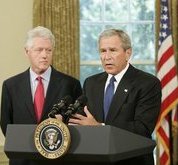
As Democrats and Republicans exchange barbs about which party is more responsible for 9/11, the general public is left with the difficult task of sorting out charges and countercharges in order to discern the truth. That onerous task is made all the more so because nearly all information originating with the partisans is—well, partisan.
There is, however, a notable exception.
That would be found in the book titled “Dereliction of Duty,” written by Lt. Col., Robert “Buzz” Patterson, USAF (Ret.) who served at the side of President Clinton, and while doing so, carried the suitcase containing America’s nuclear launch codes, also called the nuclear button.
Those in search of yet another right-wing hatchet job against President Clinton and Mrs. Clinton will be disappointed. Indeed, Patterson offers no saucy “exposes” about the private lives of the Clintons, nor does he provide a blow-by-blow account of how the first couple resolves their storied marital issues. Rather, Patterson provides a firsthand account of how President Clinton and those in his administration viewed the military and how those attitudes shaped national security and foreign policy decisions.
On Pages 129-131 of the book, Patterson recounts details about a stunning and heartbreaking lost opportunity to kill Osama bin Laden. The National Security Council (NSC) and the intelligence community had been tracking bin Laden for some time when, in the fall of 1998, professionals staffing the Situation Room in the White House were advised that “We’ve got him!”
That critical news was immediately passed on to National Security Advisor Sandy Berger, including the fact that the United States had a two-hour window in which to strike. Time was of the essence.
Upon receiving the news, Berger entered the Situation Room and immediately called President Clinton for authorization to carry out the strike. Incredibly, the president was not available. Berger tried again and again to reach the commander in chief. The window of opportunity was quickly closing.
Berger was eventually able to speak with the president but there was no decision forthcoming. President Clinton wanted to seek counsel with his secretaries of defense and state before acting.
The sad conclusion to this episode is that the Clinton administration refused to strike until the window of opportunity had slammed shut. Thus, Osama bin Laden escaped the long arm of the U.S. military, thanks to indecision, hesitation, and lack of focus by the most powerful man in the world.
While he does not pull any punches, it is clear that Patterson is writing from the buttoned-down perspective of a military professional. As such, Patterson is duty-bound to respect and defend his commander in chief in accordance with military decorum and protocol. And Patterson (the writer) does just that.
Patterson provides a summary of the Clinton approach to the war on terror on Page 131 which, in part, reads:
“The Clinton administration never responded decisively, even when given the opportunity, as it was obligated to do, with its own ‘war against terrorism.’ By failing to answer the threat as it should have, the Clinton administration was guilty of gross negligence and dereliction of duty to the safety of our nation, which the president was sworn to defend.”
Given the nature of the current debate about 9/11, “Dereliction of Duty” is a refreshing respite from the partisan wrangling that dominates mainstream media coverage of this issue.
All and all, “Dereliction of Duty” deserves a robust “Thumbs up!” and is recommended to those that seek a credible source of information about how 9/11 might have been prevented.
John W. Lillpop is a recovering liberal.